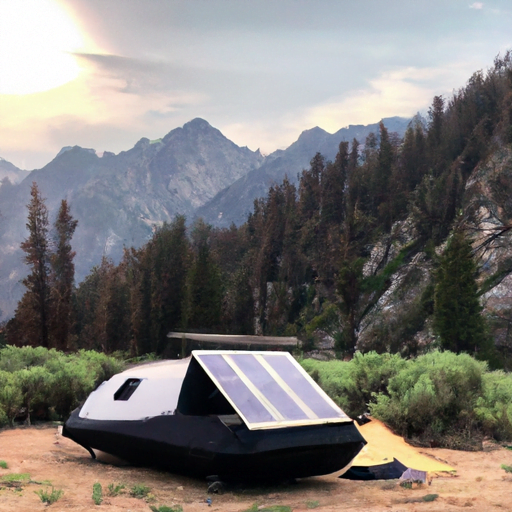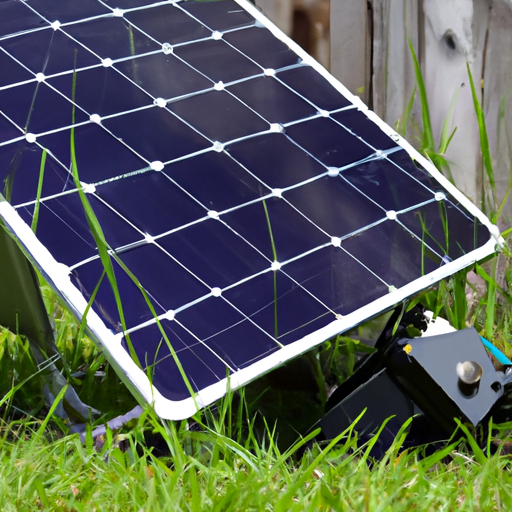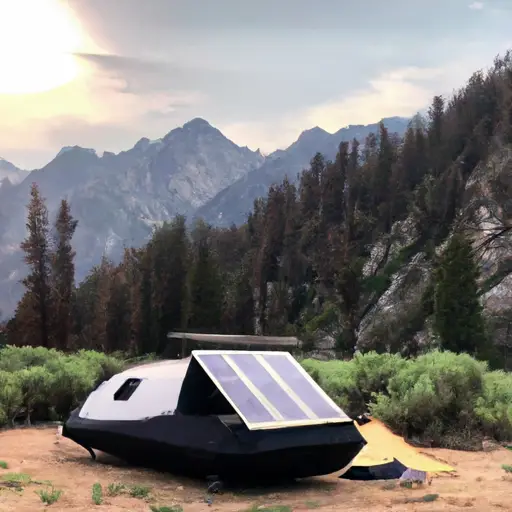Have you ever wondered how to provide power when you’re off-grid camping? It’s great to disconnect from the hustle and bustle of everyday life and spend some time in nature, but sometimes we still need access to electricity. Whether it’s to charge our devices, power a small appliance, or even just have some lights at night, having a reliable power solution is crucial.
Luckily, there are several options available for off-grid camping power solutions. One popular choice is solar power. Solar panels are lightweight, easy to set up, and harness the power of the sun to generate electricity. They can be placed on the roof of your camper van or tent, or even on the ground if you have enough space. Additionally, solar power is eco-friendly and renewable, making it a sustainable choice.
Another option for off-grid camping power is portable generators. These compact devices are powered by gasoline or propane and can provide a reliable source of electricity for your camping needs. They are easy to transport and can be used to charge your devices, run small appliances, or even power your entire campsite. However, it’s important to consider noise levels and emissions when using a generator, as they can be disruptive to the peacefulness of the outdoors.
In addition to solar power and portable generators, there are also alternative methods for off-grid camping power. Wind turbines, for example, can be used to generate electricity in areas with consistent wind patterns. They can be a bit more complex to set up and require regular maintenance, but they are a great option for those who are looking for a sustainable and reliable power solution. Additionally, you can also consider using power banks or portable battery packs to charge your devices on the go, without the need for a traditional power source.
In conclusion, providing power when off-grid camping doesn’t have to be a challenge. There are several power solutions available, from solar panels and portable generators to wind turbines and power banks. By understanding your power needs and considering your camping environment, you can choose the right option that best suits your needs. In our next article, we will dive deeper into each of these power solutions, providing more information and tips for a successful off-grid camping experience. Living off-grid while camping allows you to disconnect from the hustle and bustle of everyday life and truly connect with nature. However, one challenge that arises when camping off the grid is the need for power solutions to keep your essential devices running. In this article, we will explore various power solutions for off-grid camping, including solar power, wind power, hydro power, portable generators, and battery solutions.

Solar Power Solutions
Solar power is one of the most popular and environmentally friendly power solutions for off-grid camping. It harnesses the energy of the sun and converts it into electricity. There are several advantages to using solar power while camping. Firstly, it is a renewable energy source, meaning you can count on it even when other resources are scarce. Solar power is also silent, clean, and requires minimal maintenance.
When it comes to solar panels for camping, there are different types to choose from. Monocrystalline panels are the most efficient and compact, making them suitable for portable use. Polycrystalline panels are less expensive but slightly less efficient. Thin-film panels are lightweight and flexible, making them ideal for backpackers. When choosing the right solar setup, consider factors such as power output, size, weight, and portability.
Installing and maintaining a solar power system for camping is relatively simple. Position your solar panels in direct sunlight, preferably at a 30-45 degree angle to maximize energy production. Regularly clean the panels to remove any dust or debris that may hinder their efficiency. Additionally, check the connections and wiring to ensure they are secure and free from damage.
Wind Power Solutions
Another power solution for off-grid camping is harnessing the energy of the wind. Small-scale wind turbines can generate electricity by capturing the power of the wind and converting it into usable energy. Wind power has its own set of benefits and limitations. It is a clean and renewable energy source that can produce a considerable amount of power, especially in windy areas. However, it is highly dependent on wind conditions and may not be suitable for all camping locations.
When considering wind power, there are different types of small-scale wind turbines available. Horizontal-axis turbines are the most common and efficient, while vertical-axis turbines are compact and can capture wind from any direction. Choose a wind turbine size and capacity that aligns with your camping power needs.

Hydro Power Solutions
Utilizing water as a power source is another viable option for off-grid camping. Micro-hydro systems can generate electricity by using the flow of water, such as a river or stream, to spin a turbine and generate power. Hydro power solutions are often more suitable for camping locations near a water source.
Portable Hydroelectric Generator
There are various types of micro-hydro systems available for off-grid camping. These systems can be as simple as a portable hydroelectric generator or as complex as a system that diverts a portion of the water flow through a turbine. When considering a micro-hydro system, assess the available water source, the flow rate, and the suitability of the location for installation.
Portable Power Generators
Portable generators are a popular power solution for off-grid camping due to their versatility and convenience. They run on various fuel options such as gasoline, propane, or diesel, and can provide a reliable source of power for your camping needs. One of the main advantages of portable generators is their high power output, allowing you to run multiple devices simultaneously.
When choosing a portable generator, consider factors such as the power output, runtime, noise level, and fuel efficiency. Opt for a generator that is lightweight and portable, making it easier to transport to your camping site. It is also important to follow maintenance and safety tips provided by the manufacturer to ensure proper operation and longevity of the generator.

Battery Solutions
Battery solutions are essential for storing power generated by solar panels, wind turbines, or micro-hydro systems. They provide a reliable source of power when the sun is not shining, the wind is not blowing, or the water flow is low. Several types of batteries are suitable for off-grid power storage, including lead-acid batteries, lithium-ion batteries, and deep cycle batteries.
When considering battery solutions, sizing and capacity are crucial factors to consider. Determine the amount of power you need to store and choose a battery with the appropriate capacity to meet your camping requirements. Remember to perform regular maintenance on your batteries, such as checking the charge level, cleaning terminals, and replacing any damaged batteries.
Energy Conservation Tips
To maximize power efficiency and prolong the life of your power systems, it is important to practice energy conservation while camping off the grid. One way to conserve energy is by using energy-efficient appliances and devices. Look for devices with low power consumption and consider investing in solar-powered or rechargeable devices. Additionally, practice smart habits such as turning off lights when not in use, using power-saving modes on devices, and avoiding overcharging batteries.

Hazard Prevention
When dealing with power systems, it is crucial to prioritize safety and prevent potential hazards. Fire safety measures should be implemented, such as keeping flammable materials away from the power systems and having a fire extinguisher on hand. Electrical wiring and grounding should be done properly to avoid electrical shocks or short circuits. Always consult a professional electrician if you are unsure about any electrical work.
Emergency Power Backup
Having a backup power system is essential for emergencies while camping off the grid. It ensures that you have a continuous source of power even in unforeseen circumstances, such as a generator failure or extreme weather conditions. Create redundancy in your power systems by having multiple power sources, such as a backup generator or an additional battery bank.
Conclusion
In conclusion, there are various power solutions available for off-grid camping, each with its own advantages and limitations. Solar power, wind power, hydro power, portable generators, and battery solutions offer reliable sources of power to keep your essential devices running while enjoying the great outdoors. Remember to assess your camping needs and choose the right power solution that aligns with your requirements. By being mindful of energy conservation and prioritizing safety, you can ensure a successful and sustainable off-grid camping experience.




